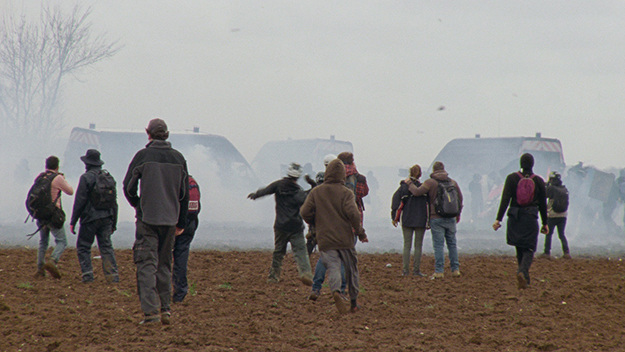The Party’s Over: Berlinale 2024
This article appeared in the February 23, 2024 edition of The Film Comment Letter, our free weekly newsletter featuring original film criticism and writing. Sign up for the Letter here. Stay up to date on all of our coverage of the Berlin International Film Festival here.

Direct Action (Guillaume Cailleau and Ben Russell, 2024)
Even though the weather was unsettlingly balmy, there was a chill in the air at this year’s Berlinale. As Jordan Cronk detailed in his dispatch last week for this publication, last September the news broke that artistic director Carlo Chatrian would be stepping down, putting an end to his team’s inspiring commitment to the cinematic vanguard and making this his fifth and final edition. Yet that controversy is insignificant in comparison with the larger situation: the ongoing genocide in Gaza, the invitation to members of the extreme-right party Alternative für Deutschland to attend the festival’s opening ceremony (rescinded after public outrage), the German government’s guilt-ridden repression of displays of solidarity with Palestine, and the resulting call for a strike from the country’s cultural institutions. Although a handful of filmmakers withdrew their participation, most decided to stay the course. Nearly 200 of these signed a letter calling for an end to the Israeli occupation, while some used Q&A sessions to stand with Palestine. Festival workers and alumni of the Berlinale Talents program also issued letters urging the self-described “most political of all major film festivals” to declare its support for a cease-fire. So far, aside from a statement from the curators of Forum Expanded (notably a section devoted to artists’ filmmaking), it hasn’t happened.
Does all this mean that participation in the Berlinale is best refused? Or is it worth attempting to carve out a space of contestation from within, however compromised, as some of this year’s filmmakers did? Should institutions be abandoned, or is their importance such that they must be reclaimed and transformed? The longest film in the festival, Dimitris Athiridis’s 14-hour observational documentary exergue – on documenta 14, spoke to these urgent questions. “In the dark times / will there also be singing? / Yes, there will also be singing. / About the dark times,” wrote Bertolt Brecht in 1939. These words are acutely apposite to Athiridis’s sprawling account of the making of the divisive edition of the quinquennial art exhibition that took place in Kassel and Athens in 2017. It was impossible not to see this film through the lens of current events, impossible not to find in it a prescient and granular account of the contradictions that gnaw at cultural institutions like the Berlinale and the multidisciplinary arts institution Haus der Kulturen der Welt, which provide platforms for political positions that are at odds with those of their primary funder, the federal government.
Exergue is in one sense a character study realized through a mind-boggling level of access, with Athiridis following artistic director Adam Szymczyk through curatorial meetings, studio visits, public events, budget problems, and parties. It is also an anatomization of an institution on the brink, with no less than three members of the curatorial team—Szymczyk, Paul B. Preciado, and Dieter Roelstraete—making the same statement at different moments: “The party’s over.” They could not have known that the subsequent edition of documenta would be corroded by accusations of anti-Semitism and that the planning for the one after that would implode under political pressure after Ranjit Hoskote, a member of the committee tasked with finding the next artistic director, was denounced for supporting the Boycott, Divestment, Sanctions movement. Yet exergue shows that the writing was already on the wall years before, revealing the curators’ profound awareness of the swirl of problems facing publicly funded “political art” in the age of privatization and polycrisis. The film foregoes the glitz typically found in exposés of the art world to foreground, instead, the myriad financial, institutional, and ideological conflicts of documenta 14—including the censorship of a performance by Franco “Bifo” Berardi that German politicians and Jewish groups in the country accused of “relativizing” the Holocaust.
The film’s mostly observational form means that Athiridis’s main intent is to document rather than cast explicit judgment; each viewer will come to their own conclusion as to how to assess Szymczyk and his decision to bring a German mega-exhibition to Greece just a few years after the latter’s sovereign debt crisis and subsequent political turmoil. One thing, however, is certain: through the grueling, multiyear process of making this happen, Szymczyk and his team show a sincere belief in art’s capacity to confront the darkest aspects of the past and present. They manifest a tenacious commitment to public transparency. On the street in Athens, someone has written that “documenta is the Botox of capitalism,” calling out the expo as a gentrifying force, a promise of rejuvenation that is in fact an injection of toxins; Szymczyk, meanwhile, hears Brecht’s song and seeks to share it, even if it means going over budget, making a market-unfriendly exhibition with themes of colonialism, indigeneity, war, and migration at its heart. Athiridis’s record shows how critique and creativity can come from within the belly of the beast, without ever letting its viewer forget that there is a price to pay along the way.
An observational impulse also fueled several other standout documentaries in this year’s lineup. After winning the Encounters section with Mutzenbacher in 2022, Ruth Beckermann returned with Favoriten, shot over several years at an elementary school in the titular district of Vienna. The Austrian capital has been a persistent preoccupation of Beckermann’s for nearly five decades, but it is never the city of Mozart or even Freud or Schnitzler, embalmed for tourists, that captures her sharp eye. Her Vienna is home to people who are more likely than not to have experienced some form of deracination, whether by choice or otherwise. In many of her earlier works, her subject is the Jewish diaspora; here, it is recent immigrants to Austria, primarily from Middle Eastern and Eastern European countries. Favoriten is a touching depiction of charming children and their formidable teacher Ilkay Idiskut, but while the film is full of joy, it would be unwise to belittle it as merely heartwarming. In the multicultural classroom, Beckermann discerns a microcosm of political reality. It is a public site of antagonism and affinity, a place where fictions of national unity and xenophobic stereotypes alike dissolve when faced with the bracing particularity of young lives in the making.
In Guillaume Cailleau and Ben Russell’s Direct Action, rigorously durational observation is deployed to document the daily activities of the zone à défendre (ZAD, or “zone to defend”) of Notre-Dame-des-Landes, an occupation movement that successfully blocked government attempts to construct an airport in a rural commune, and which continues to participate in broad-reaching ecological struggles. With a strong inheritance from the avant-gardist structural film movement of the 1960s and ’70s and a focus on radical opposition, Direct Action is an altogether different project than Favoriten. Nevertheless, there are parallels: a generous gaze cast upon a local situation in which diverse individuals exist together on common ground, and an insistence that the impersonality of observation can puncture stereotype, oppose spectacle, and offer an alternative to cinematic forms that propagate an ideology of individualism.
Across 216 minutes, Cailleau and Russell use 16mm film to show how things get done when people withdraw from capitalism and the state, both materially and ideologically. Making crêpes, tending to animals, screen-printing, caring for children, forging solidarity, confronting the police: a different life is underway, banal and extraordinary, here and now, built across coalitions of difference. Viewers hoping for a robust exposition of the ZAD will be disappointed, but this can be found elsewhere. Direct Action is a superlative example of the daring kind of filmmaking the now-endangered Encounters strand was created to support; rather than telling a story, it describes a place. It insistently compels its viewer to consider the relationship between form and content, to reflect on directness and direction while delving into one of the most significant political struggles of contemporary Europe with disarming concreteness. Just before the film’s intermission, a man flies a drone over the territory; as it soars through the clouds, it produces breathtaking vistas of the firmament and the land below. Direct Action seems to include this anomalous shot only to foreground the extent to which the film is in fact concerned with all that the drone’s view-from-afar can’t see, such as the way dough comes together under laboring hands, or the faces of masses of people who flood across a field to oppose the construction of a reservoir, insisting that water belongs to all.
In the main Competition section, Mati Diop’s Dahomey stood out as a chiseled account of the restitution of 26 artifacts, looted from the titular kingdom in the 1890s, to what is present-day Benin. Diop picks up where films such as Nii Kwate Owoo’s You Hide Me (1970) left off, carrying forward an indictment of the captivity of African cultural patrimony in European institutions. In the film’s opening moments, small, multicolored Eiffel Tower tchotchkes are seen for sale on the street, twinkling in the night: the icon of the metropole reduced to cheap tat. Dahomey redraws the map; it finds its grandeur elsewhere. The film could be viewed as an example of what scholar Salomé Aguilera Skvirsky has called the “process genre,” beginning as it does with the preparation of the objects for shipment and then detailing their arrival in Benin, their uncrating, condition assessment, exhibition, and the subsequent discussions they spark—particularly at the Université d’Abomey-Calavi, where eloquent students invigoratingly disagree on how to assess this return. At the same time, Diop infuses her film with spectral and animistic energies. An electronically processed voiceover speaks intermittently from the perspective of one of the sculptures, relating a long life of violence and exile, and recognizing that there is nothing simple about a belated homecoming. This is not the first time a Berlinale filmmaker has given voice to a nonhuman entity: Hira Nabi’s All that Perishes at the Edge of Land (2019) does so with the remaindered body of a ship slated for dismantlement in Bangladesh, while Nelson Carlo de Los Santos Arias’s Pepe, in this year’s Competition slate, is narrated by a hippopotamus belonging to Pablo Escobar. Yet Diop makes particularly successful use of this risky device, marrying observational elements with a speculative poetics to broach themes of decolonization and memory.
However different from one another these impressive films are, there is something that binds them together beyond the use of observation: they all document gatherings that are marked by disagreement and difference, but which nonetheless retain a commitment to collectivity. Today, calls for “dialogue” and “complexity” too often get used as liberal alibis, as cover for a refusal to acknowledge the brutality of Israeli occupation and the destruction of Palestinian life. (Case in point: the Berlinale’s Tiny House Project, which invited visitors into a shed “to engage in dialogue about the Middle East conflict.”) But the co-option of these qualities does not ruin their worth; in these beautifully nondidactic films, they come through in a necessary form. Yes, there is singing in and about the dark times. There is also dissent—and it comes from both within and without.
Erika Balsom is a reader in film studies at King’s College London and the co-editor of Feminist Worldmaking and the Moving Image (MIT Press, 2022).







